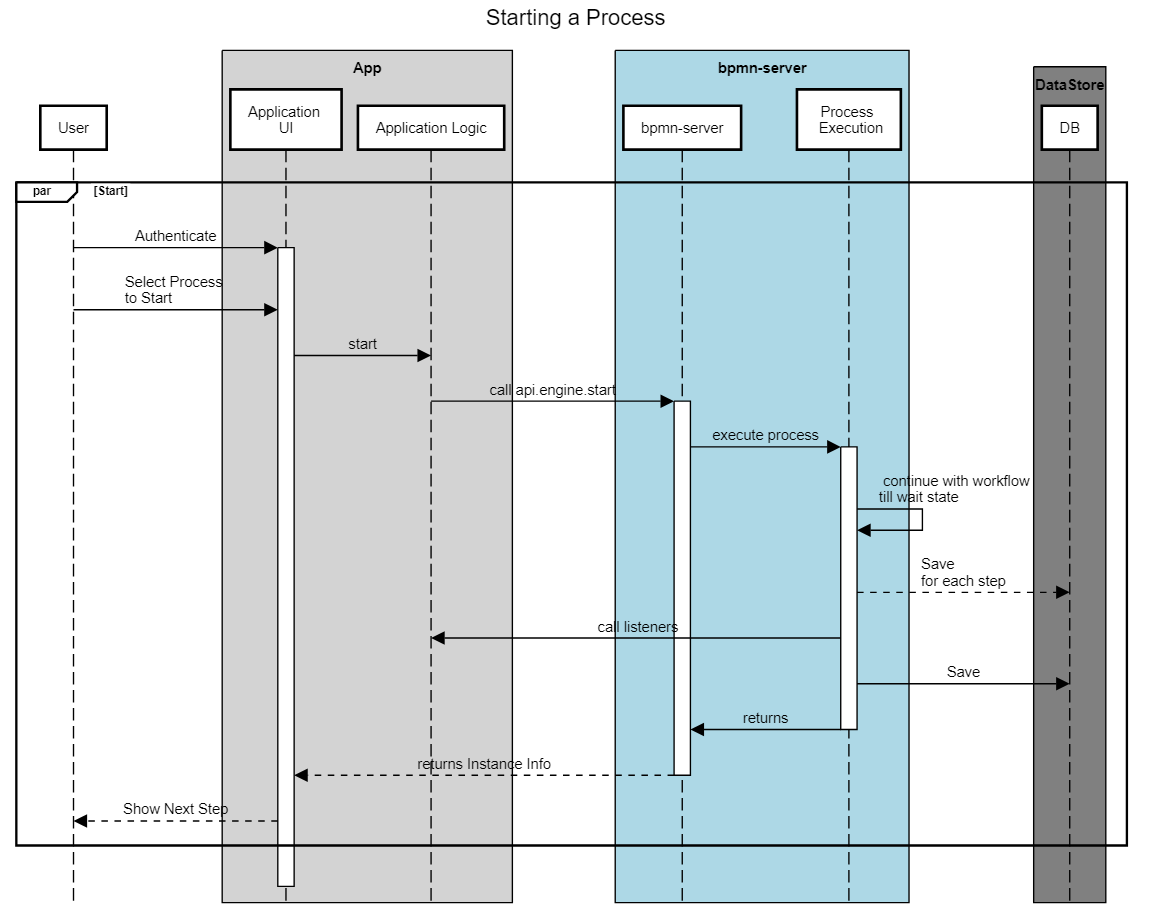Workflow Execution#
Execution is based on the model logic that is enhanced by various extensions that allow scripting and access to your application.
During Execution, Model Listeners and Application Listeners are invoked.
Process Execution is performed based on BPMN 2.0 standards providing access to the following components to participate: - Event Listener - Scripts - Services - AppDelegate
The execution engine is availabe through an API see API.engine.
Starting a Process#
For more details about scenarios of Invoking Execution Engine Engine Invokation
| This illustrate the flow of Model Execution: Once the process goes into a **wait** state, it waits for some external input: - User Input - Message/Signal to be received - Timer to expire |  |
Invoking a User Task#

Execution Sequence#
Below is the sequence of events after each command:
engine.start#
---Event: -->process.start { option1: 1234 }
=========== Process Start ===============
---Event: -->start item: StartEvent_1 { option1: 1234 }
---Event: -->process.saving { option1: 1234 }
---Event: -->end item: StartEvent_1 { option1: 1234 }
---Event: -->start item: Request { option1: 1234 }
---Event: -->wait item: Request { option1: 1234 }
---Event: -->process.wait { option1: 1234 }
---Event: -->process.saving { option1: 1234 }
engine.assign#
---calling assign-----
---Event: -->process.restored { option1: 1234, restored: true }
---Event: -->assign item: Request { option1: 1234, restored: true }
---Event: -->validate item: Request { option1: 1234, restored: true }
---Event: -->process.saving { option1: 1234, restored: true }
engine.invoke#
---calling invoke-----
---Event: -->process.restored { option1: 1234, restored: true }
---Event: -->process.invoke { option1: 1234, restored: true }
---Event: -->validate item: Request { option1: 1234, restored: true }
---Event: -->end item: Request { option1: 1234, restored: true }
---Event: -->start item: Approve { option1: 1234, restored: true }
---Event: -->wait item: Approve { option1: 1234, restored: true }
---Event: -->process.invoked { option1: 1234, restored: true }
---Event: -->process.saving { option1: 1234, restored: true }
engine.invoke (with validation failure)#
---invoke Approve-----
---Event: -->process.restored { option1: 1234, restored: true }
---Event: -->process.invoke { option1: 1234, restored: true }
---Event: -->validate item: Approve { option1: 1234, restored: true }
---Event: -->process.error { option1: 1234, restored: true }
***************BPMNServer UNCAUGHT ERROR***********
Error Message: Error: Validation failed with error:Not a valid value
Scope and variables#
See Scope and Variables in Scripts
Scripts and Services Impact on Execution#
Scripts and Services can impact workflow in the following manners: - Change workflow Data - Service Tasks and Script Tasks, receive input and return output - Scripts and Service Task can raise Errors and Exceptions
Raisng Errors , Escalations and Exceptions#
Validation Scripts#
Validation Scripts can return an error as such:
As a result execution will raise an exception and the command will fail.

BPMN Errors#
All Scripts and Services can Raise BPMN Errors, to be handled by the appropriate Error node
All Scripts and Services can Raise BPMN Escalation, to be handled by the appropriate Catch Escalation Event
error and execution will continue at the Error node.
Throwing Exceptions#
This will raise an Excption, stop workflow execution and save the instance datatake action